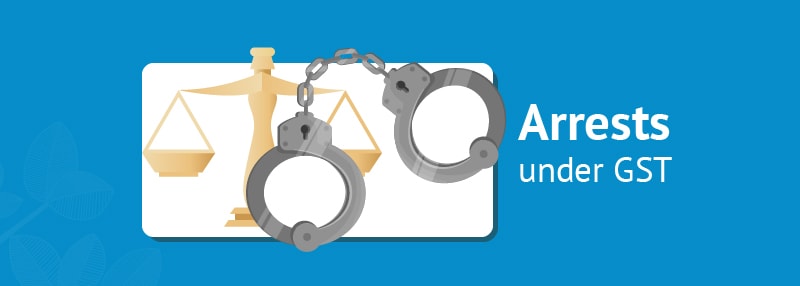Arrest under GST
The term ‘Arrest’ has not been defined in the CGST / SGST Act. However, as per the law, it basically implies the taking into custody of a person under some lawful command or authority. In other words, a person is said to be arrested when he is taken and restrained of his liberty by power or colour of lawful warrant.
If the Commissioner of CGST / SGST believes that a person has committed an offence, he can be arrested by any authorised CGST / SGST officer. The arrested person will be informed about the grounds of his GST arrest motion, and he will appear before the magistrate within a period of 24 hours, in case the offence is of a cognizable nature.
As per the arrest provisions under GST, the following officers have been empowered and are required to assist the CGST / SGST officers in the execution of an arrest under GST:
- Police
- Railways
- Customs
- Officers of State / UT / Central Government engaged in collection of GST
- Officers of State / UT / Central Government engaged in collection of land revenue
- All village officers
- Any other class of officers as may be notified by the Central/State Government
Note: Here, it is important to note the difference between a cognizable and a non-cognizable offense. Cognizable offenses are those where the police can arrest a person without any arrest warrant, i.e. the offense is clear enough. Examples could be murder, robbery, counterfeiting etc. Non-cognizable offenses are those, where a police officer cannot arrest a person without a warrant issued by a competent authority. They are relatively less serious crimes like public nuisance, assault etc.
Offenses which warrant Arrest under GST
The following are the offenses, for which the arrest provisions under GST become applicable:
- When a taxable person supplies any goods or services without any invoice or issues a false invoice
- When a taxable person issues any invoice or bill without supply of goods / services in violation of the provisions of GST
- When a taxable person collects GST, but does not submit it to the government within 3 months
- When a taxable person has already been convicted earlier under the same provisions i.e. this is his 2nd offense
To sum up the offences which warrant arrests, broadly it may be said, that if tax evasion is more than INR 100 lakhs i.e. INR 1 Crore, or when a person has committed his 2nd offense (i.e. first arrest under GST has occured already), an arrest will be made.
Procedures related to Arrest under GST – Points to Note
The following are certain key procedures that you should note with regards to arrest provisions in GST:
- Cognizance of Offense – A court cannot take cognizance of any offense punishable without the prior permission of the designated authority. Only a Magistrate of the First Class (and above) can conduct the trial for such an offense.
- Availability of Bail – Bail is available only for non-cognizable and specified bail-able offenses.
- Summons – A proper officer can summon any person to provide evidence or to produce a document. Any person summoned, has to either attend the summon himself, or send an authorized representative. Both entities will appear under oath.
Taking a holistic view of inspection, search, seizure and arrest under GST, it can be concluded that the government as well as the GST body have well defined arrest provisions in GST, to restrict tax evasion activities across the nation. Given the stringent nature of these offenses, which attract sizeable penalty, taxpayers would hopefully be discouraged from engaging in any illegal business practices.
